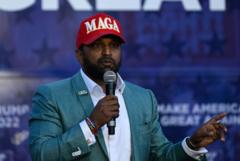Patel's nomination comes as he has publicly called for substantial reforms within the FBI, even proposing the dismissal of leadership ranks he deems corrupt. In his memoir, "Government Gangsters", he details what he considers pervasive "government tyranny" within the agency. His perspective may reflect broader conservative sentiments regarding perceived overreach in federal law enforcement.
As the son of Indian immigrants, Patel's background combined with his legal experience as a former defense lawyer and federal prosecutor has shaped his political career, attracting Trump's attention when he worked as senior counsel for the House Intelligence Committee in 2017. With a significant role in the previous administration, Patel's influence extended to collaborations that espouse pro-Trump narratives, including children’s literature that critiques political adversaries.
Moreover, Patel’s disdain for the media, which he labels an adversary to American interests, underscores a continuing trend among parts of the Republican leadership that view informational channels as potentially biased against their agendas. His involvement with the Trump Media and Technology Group, and a lucrative consulting contract, also position him firmly within Trump's political orbit.
The nomination of Patel may signal an intention to reshape federal law enforcement in a way that resonates with Trump's base, appealing to those who share concerns regarding the integrity and accountability of government agencies. With Patel at the helm of the FBI, it's likely that his leadership will reflect a commitment to those who believe in a significant overhaul of current practices and oversight within the bureau.
In conclusion, Patel's FBI nomination embodies a continuation of Trump's controversial political strategies, focusing on loyalty and challenging established governmental norms.
As the son of Indian immigrants, Patel's background combined with his legal experience as a former defense lawyer and federal prosecutor has shaped his political career, attracting Trump's attention when he worked as senior counsel for the House Intelligence Committee in 2017. With a significant role in the previous administration, Patel's influence extended to collaborations that espouse pro-Trump narratives, including children’s literature that critiques political adversaries.
Moreover, Patel’s disdain for the media, which he labels an adversary to American interests, underscores a continuing trend among parts of the Republican leadership that view informational channels as potentially biased against their agendas. His involvement with the Trump Media and Technology Group, and a lucrative consulting contract, also position him firmly within Trump's political orbit.
The nomination of Patel may signal an intention to reshape federal law enforcement in a way that resonates with Trump's base, appealing to those who share concerns regarding the integrity and accountability of government agencies. With Patel at the helm of the FBI, it's likely that his leadership will reflect a commitment to those who believe in a significant overhaul of current practices and oversight within the bureau.
In conclusion, Patel's FBI nomination embodies a continuation of Trump's controversial political strategies, focusing on loyalty and challenging established governmental norms.




















